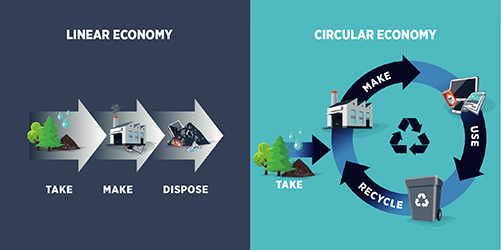2nd Hand Equipment - Coming soon!

We are now putting the final touches to the World Mining Equipment 2nd Hand market place. If you would like information on this service contact


Climate change, environmental pollution, resource scarcity, global population growth: these are the defining issues of the 21st century. Approaching them by transitioning to a circular economy is one of the central challenges of our time. TOMRA, a global leader in sensor-based technologies with more than 50 years’ experience in diverse sectors such as the Food, Recycling and Mining industries, has understood that technology alone is not enough to create a closed-loop circular economy: public policy, consumer engagement and collaboration across the value chain are necessary too. Making the shift from linear to circular to build thriving economies requires radically lessening the environmental impact of extracting raw materials, reducing the use of primary resources, designing waste-free products, harnessing materials to keep them in use and implementing technologies to ensure the system is regenerative.
A holistic approach to achieving a circular economy: ReSociety
TOMRA is excellently positioned to contribute to the transition to a circular economy by collaborating with key players across the value chain to develop new methods, processes, technologies and business models. To this end, it has created ReSociety, a global collaborative initiative to re-think, re-act and re-start our world for a more sustainable future. It is a place for industry, policymakers, companies and consumers to share ideas, increase awareness, collaborate with solution enablers and drive impactful change. It is also a hub in which TOMRA proactively shares its vast research and multi-national studies on holistic waste management systems, which have been indispensable in developing the circular value chains.
“Our commitment to the circular economy is unequivocal,” says Dr. Volker Rehrmann, Head of Circular Economy, TOMRA. “Until recently, it was unheard of having players from the entire value chain at one table. From chemical companies to converters, retailers and brand owners, waste management companies and recyclers – there’s true dedication in finding solutions. We take pride in doing our part: sharing our know-how, developing new solutions and striving to make our planet more sustainable every day. We have started with the recycling sector, and in particular in addressing the plastics waste issue, where the collaboration with the different stakeholders is proving very fruitful. However, if we want to leave a better world to future generations, we can’t stop at recycling; all sectors need to do their part. That is why at TOMRA we aim to build on the experience we developed in recycling and collaborate with the mining industry to reduce the environmental impact of its operations. This means finding green mining solutions that use less energy and water to recover resources – with a consequent reduction in CO2 emissions – and ways to turn waste into value. With the recycling sector, we are working on reducing the mountains of plastic waste; we want to do the same in mining and address the dumps and tailings building up in mines.”
More Information: http://www.tomra.com/mining